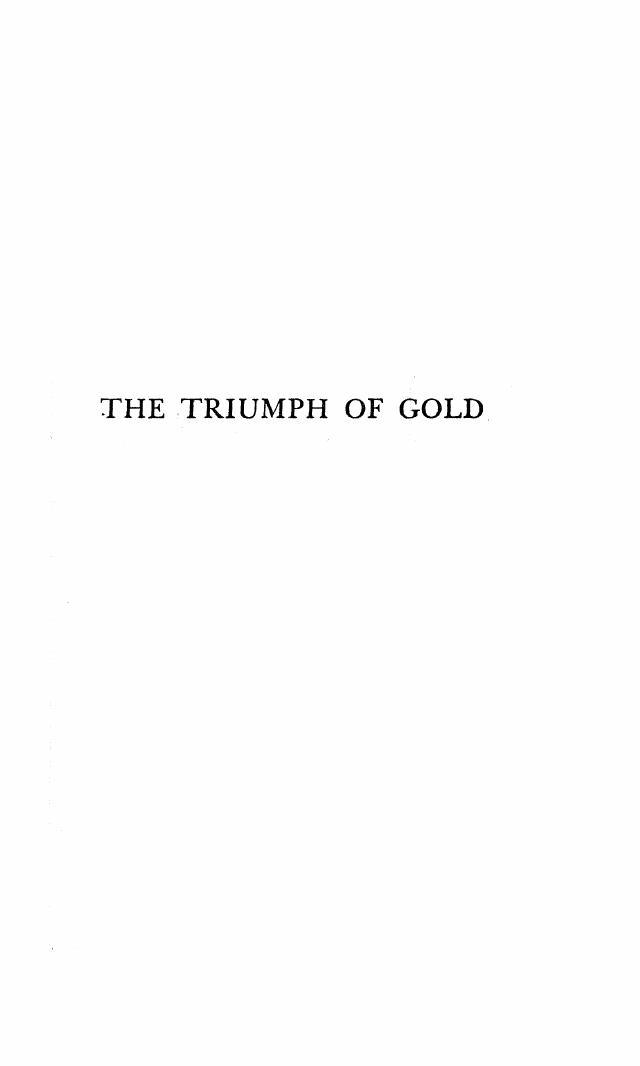The Triumph of Gold by Charles Rist

Author:Charles Rist
Language: eng
Format: epub, mobi, pdf
ISBN: 978-1-61016-568-6
11
The Price of Gold in the United States
(L’Opinion, February 15, 1951)
Gold is again the order of the day. It will remain that so long as it has not been restored to its function as international money. Until then its price will continue to bring us surprises. Meanwhile, it is not idle to call attention to a few of the paradoxes caused by the strange situation in which it is placed both as merchandise and as money.
Let us remember, first, that there are two types of fluctuations of the precious metal that are not generally distinguished one from the other, which produce two rates of exchange: the exchange rate as regards various paper currencies, especially the franc, and the rate as regards merchandise, a rate which, for obvious reasons, is quoted nowhere, of which one hardly ever thinks, but which must never be lost sight of.
The rate of exchange of gold for paper expresses today the relative degree of confidence felt by the public toward these two currencies. Every time that new threats of inflation appear at one of the sensitive points of the world economy, the price of gold expressed in paper money tends to increase. This is the expression, pure and simple, of the distrust or confidence felt by the public toward the official money. The duration of the Korean War having imposed a massive rearming on the United States, accompanied by the expenses that such rearming necessitates, instantly the fear of inflation gripped both the European markets and the American market itself. The rise in the New York Exchange at the present time expresses the anxieties of the American public regarding a possible inflation. In Europe these anxieties had an immediate repercussion on the gold market.
In former times, when bank notes and bank deposits were convertible into gold, there was no question of the primacy of gold over paper. The purchasing power of gold as regards merchandise, and the purchasing power of the representative moneys equivalent to gold alone attracted attention. Paper money or gold interested the public hardly more than as regards the amount of merchandise it was able to buy, its function as reserve attracting no attention because of its being taken for granted. Today the public is interested only in the price of gold in paper money, and this price is essentially determined by the public’s concern to create reserves, paper money having lost the qualities apt to assure this essential function.
One of the fundamental needs of individuals in a normal economy is to create durable reserves for themselves. Economic man lives much more in the future than in the present. He has thus always made reserves with this future in mind, whether in accumulating real estate—lands, buildings, etc.—whether by acquiring securities—bonds, stocks, mortgages—or, finally, by simply accumulating money. The desire to create reserves is one of the fundamental needs of so-called civilized societies. This is more easily accomplished, naturally, by acquiring assets that are easily transferable, so long as their value can be expressed in stable money.
Download
The Triumph of Gold by Charles Rist.mobi
The Triumph of Gold by Charles Rist.pdf
This site does not store any files on its server. We only index and link to content provided by other sites. Please contact the content providers to delete copyright contents if any and email us, we'll remove relevant links or contents immediately.
The Brazilian Economy since the Great Financial Crisis of 20072008 by Philip Arestis Carolina Troncoso Baltar & Daniela Magalhães Prates(130228)
International Integration of the Brazilian Economy by Elias C. Grivoyannis(100274)
The Art of Coaching by Elena Aguilar(53081)
Flexible Working by Dale Gemma;(23271)
How to Stop Living Paycheck to Paycheck by Avery Breyer(19672)
The Acquirer's Multiple: How the Billionaire Contrarians of Deep Value Beat the Market by Tobias Carlisle(12288)
Thinking, Fast and Slow by Kahneman Daniel(12172)
The Radium Girls by Kate Moore(11980)
The Art of Thinking Clearly by Rolf Dobelli(10341)
Hit Refresh by Satya Nadella(9090)
The Compound Effect by Darren Hardy(8884)
Tools of Titans by Timothy Ferriss(8319)
Atomic Habits: Tiny Changes, Remarkable Results by James Clear(8261)
Turbulence by E. J. Noyes(7987)
A Court of Wings and Ruin by Sarah J. Maas(7747)
Change Your Questions, Change Your Life by Marilee Adams(7695)
Nudge - Improving Decisions about Health, Wealth, and Happiness by Thaler Sunstein(7667)
How to Be a Bawse: A Guide to Conquering Life by Lilly Singh(7441)
Win Bigly by Scott Adams(7149)
